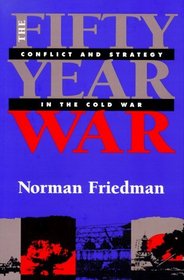Search -
The Fifty-Year War: Conflict and Strategy in the Cold War
The Fifty-Year War Conflict and Strategy in the Cold War
Author:
For fifty years the Cold War shaped our lives and divided our world and its influence will continue for decades to come. While other authors have portrayed the period as an uneasy "peace" enforced by the mutually assured destruction of atomic and nuclear weapons, Norman Friedman has synthesized a vast array of information from a diverse spectrum... more »
Author:
For fifty years the Cold War shaped our lives and divided our world and its influence will continue for decades to come. While other authors have portrayed the period as an uneasy "peace" enforced by the mutually assured destruction of atomic and nuclear weapons, Norman Friedman has synthesized a vast array of information from a diverse spectrum... more »
ISBN-13: 9781557502643
ISBN-10: 1557502641
Publication Date: 11/1999
Pages: 597
Rating: ?
ISBN-10: 1557502641
Publication Date: 11/1999
Pages: 597
Rating: ?
0 stars, based on 0 rating
Publisher: Naval Institute Press
Book Type: Hardcover
Other Versions: Paperback
Members Wishing: 0
Reviews: Amazon | Write a Review
Book Type: Hardcover
Other Versions: Paperback
Members Wishing: 0
Reviews: Amazon | Write a Review
Genres:
- History >> Military >> Strategy
- History >> Military >> Weapons & Warfare >> Nuclear
- History >> World >> 20th Century
- Uncategorized >> International & World Politics >> Relations




